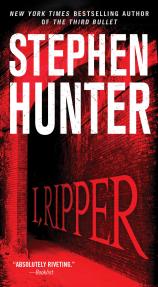I, Ripper
Review
I, Ripper
Stephen Hunter’s epic saga of the Swagger family has included such titles as HAVANA and HOT SPRINGS. While THE THIRD BULLET does not quite meet the definition of “historical,” as applied to genre fiction, it most certainly is preoccupied with a historical event. I, RIPPER, though, is anchored solidly in the (almost) fictitious past. Its subject matter is a bit of a surprise, given the themes of Hunter’s other work. This feeling lingers even with the knowledge that Hunter had considered writing a historical work of fiction about iconic serial killer Jack the Ripper before Bob Lee Swagger was even a gleam in his eye. There is also the question of “why?” tinged with perhaps a bit of “so what?”, as in “So what could Hunter possibly have to add to the voluminous, if not exhaustive, documentation of Jack the Ripper and his activities?
The answer is a bit of a shock, starting with the first page. The narrative is divided into three alternating sections, primarily consisting of “Jeb’s Memoir” and “The Diary,” with the third and lesser portion being a series of letters, never sent, from a young and besotted London prostitute to her mother.
"I, RIPPER is a historical crime novel, but carefully explores the society and the mores that are woven through the book’s geographical backdrop."
“Jeb’s Memoir” is the account of a young journalist who finds himself writing the story of the century in London as an unknown killer strikes again and again with increasing frenzy, taking a mad vengeance against prostitutes for a period of three terrifying months in 1888, with law enforcement appearing both hapless and helpless. The journalist, whose true identity is concealed until almost the end of the book, goes by the byline of “Jeb” and quickly acquires a name for himself, not only as a reporter but also as a somewhat uneasy go-between for the press and police.
“The Diary” is the account of Jack himself, an over-the-shoulder look at the fiend’s actions and motivations. Taken together, Hunter paints a picture that, while (almost) bereft of his trademark firearm lore, is as meticulously researched as anything he has ever done. Hunter is one of those very rare authors who can stimulate all the senses on the printed page, and he does so here. His description of the streets of London at that time, when horses are the primary mode of transportation, is worth the price of admission all by itself; one cannot walk away from it without giving thanks to the transition from equine power to the combustible engine. As for the descriptions of Jack’s increasingly violent attacks, readers will become intimately acquainted with the damage one can do with a sharp object, thanks to the end result of Hunter’s extensive research into crime scene accounts and autopsy records.
Does I, RIPPER include a reason for the cessation of Jack’s activities? Yes, indeed. The true surprise here, though, is the identity not so much of Jack, but of Jeb, who walks away from the book as an even bigger star in London’s firmament than Jack himself.
I, RIPPER is a historical crime novel, but carefully explores the society and the mores that are woven through the book’s geographical backdrop. It should come as little or no surprise as to who was initially blamed for Jack’s activities, or why Jack was able to act with some degree of impunity while wreaking his vengeance. However, it’s the presentation that makes I, RIPPER ultimately worth reading.
Reviewed by Joe Hartlaub on May 22, 2015
I, Ripper
- Publication Date: December 29, 2015
- Genres: Fiction, Historical Fiction, Historical Thriller, Suspense, Thriller
- Mass Market Paperback: 432 pages
- Publisher: Pocket Books
- ISBN-10: 1476764867
- ISBN-13: 9781476764863





